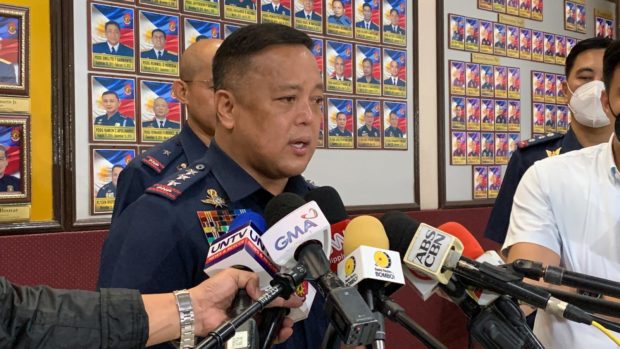
Lt. Gen. Rhodel Sermonia (File photo by JEAN MANGALUZ / INQUIRER.net)
MANILA, Philippines — Lt. Gen. Rhodel Sermonia, who’s in charge of the Office of the Deputy Chief for Administration of the Philippine National Police (PNP), is not keen on comparing the anti-drug wars of the Marcos administration to that of the Duterte administration.
“I just want to clarify, we are not here to compare the strategy on what we’ve done in the past administration, because I myself was part of that past administration. And we believe that we have been very, very, effective in our police operations in the past,” Sermonia told reporters in a press briefing on Monday.
He had been asked if the current campaign would be “less bloody” than the previous one, considering that President Ferdinand Marcos Jr., Interior Secretary Benjamin Abalos Jr., and PNP chief Gen. Rodolfo Azurin Jr. had assured the public that the new drug war would uphold the rights of suspects.
Sermonia had been designed OIC of the PNP as Azurin had flown to France to attend the annual conference of the International Criminal Police Organization (Interpol).
“Now, as to your question if it would be bloody. It will be bloody — not really. Bloody is not the right term. It is wrong. If drug suspects insist on fighting it out, of course, you as a police officer should act ahead of them. But we always emphasize to our operatives the respect for human rights,” Sermonia said.
“But if we cannot avoid it, because they really try to fight and resist arrest, we would not allow them to hit first. So number one here is the guidance of our [interior] secretary is the respect for human rights,” he added.
The press briefing took place just two days after the launch of the Buhay Ingatan, Droga’y Ayawan (BIDA) Program, a renewed approach to the drug menace that would shift focus from police-centric operations to reducing the demand for illegal drugs.
According to Abalos, it is wrong to put the drug campaign solely in the hands of law enforcers as it needs a multifaceted approach.
Sermonia agreed. He said the program would take a similar whole-of-nation approach to drugs that the National Task Force to End Local Communist Armed Conflict was to the communist insurgency.
“If we have the whole of the nation in ending the local communist armed conflict, we’re going to apply the same strategy [to drugs]. That’s why we told police officers that we have to stop owning the problem because the problem cannot be solved alone by us,” Sermonia said.
“In the past years, we bonded together to fight illegal drugs. We were really, really good at police interdiction, at supply reduction. But we came up short in other aspects. We failed to focus on demand reduction. In the BIDA Program, supply reduction and demand reduction would go together,” he added.
Abalos is not the only official to have highlighted a shift in the conduct of drug operations. While he got flak for it, Azurin last Nov. 16 pointed out that there was always the possibility of a minimal amount of drug suspects getting killed in anti-drug operations.
Marcos himself also spoke about adjusting the drug war, saying last September that operations need to focus on drug lords and not small fry.